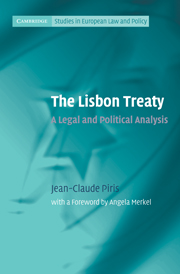Book contents
- Frontmatter
- Contents
- List of boxes
- Foreword by Angela Merkel, Chancellor of the Federal Republic of Germany
- Acknowledgements
- Table of cases
- List of abbreviations
- Introduction
- I The origins and birth of the Lisbon Treaty
- II General provisions
- III Democracy
- IV Fundamental Rights
- V Freedom, Security and Justice
- VI Institutions
- VII External affairs
- VIII Financial, economic, social and other internal affairs
- Conclusion: the Lisbon Treaty and beyond
- Appendixes
- References
- Index
- References
Conclusion: the Lisbon Treaty and beyond
Published online by Cambridge University Press: 05 June 2012
- Frontmatter
- Contents
- List of boxes
- Foreword by Angela Merkel, Chancellor of the Federal Republic of Germany
- Acknowledgements
- Table of cases
- List of abbreviations
- Introduction
- I The origins and birth of the Lisbon Treaty
- II General provisions
- III Democracy
- IV Fundamental Rights
- V Freedom, Security and Justice
- VI Institutions
- VII External affairs
- VIII Financial, economic, social and other internal affairs
- Conclusion: the Lisbon Treaty and beyond
- Appendixes
- References
- Index
- References
Summary
Knowing the history and the context of the negotiation and of the birth of a treaty is useful. Having a clear legal interpretation of its provisions is necessary. However, the real story of a treaty begins with its implementation. For the Lisbon Treaty, even more than for other treaties, this story is impossible to foresee.
This is more the case for the Lisbon Treaty than for any preceding European Treaty, because it was not negotiated in the same way. Its substance was negotiated mostly by politicians within the European Convention, and not by diplomats within an IGC. This partly explains why some of its provisions leave room for flexibility in the way they will be implemented in practice. This is the case for the way in which the High Representative, Catherine Ashton, will play her complex role as well being also, at the same time, President of the Foreign Affairs Council and Vice-President of the Commission. This is also the case for the way in which the President of the European Council, Herman Van Rompuy, the President of the Commission, José Manuel Barroso, and the six-monthly rotating Presidency of the Council will organise their relations, or for the role that the General Affairs Council and Coreper could play in those relations. Therefore the fate of the Lisbon Treaty will not only depend on its text.
- Type
- Chapter
- Information
- The Lisbon TreatyA Legal and Political Analysis, pp. 324 - 340Publisher: Cambridge University PressPrint publication year: 2010

